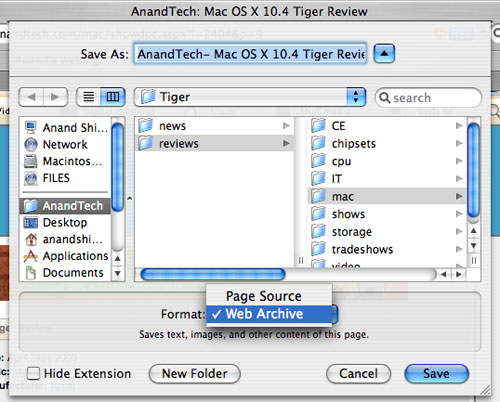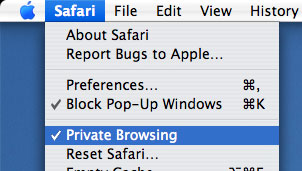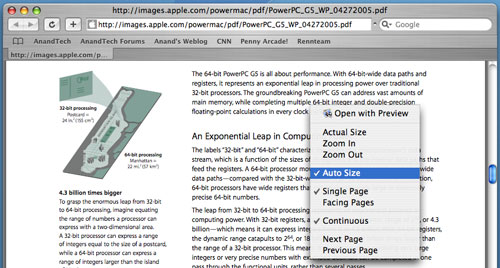Safari RSS (aka Safari 2)
In my first encounter with a Mac, I ragged on Safari for being a major disappointment under OS X; the browser looked great and was very user friendly, but it was sluggish and had a handful of annoying incompatibilities. With Tiger, Apple ships an updated version of Safari called Safari RSS.As its name implies, Safari RSS now allows you to read RSS feeds directly within the browser. Safari's integrated RSS reader is easy to read, well laid out, and works well within the Safari interface. I haven't really caught the RSS bug just yet, but Safari's implementation is quite nice. The only problem I have with it is that if a site offers more than one RSS feed, there's no way of accessing any but the first RSS feed listed in the site's code (Firefox will let you subscribe to any of multiple RSS feeds off of a single site without any problems).




Shortly before Tiger's official ship date, Apple released a brand new update of Safari for Panther users - Safari 1.3. Safari 1.3 (a part of OS X 10.3.9) offered some major improvements, mostly in the areas of performance and stability. The latest version of Safari finally solved the vast majority of my performance complaints about the browser, and as you would expect, Safari 1.3 under Panther performs quite similarly to Safari RSS under Tiger.
There are many cases now where Safari is actually faster than Firefox, but there are still some situations where Firefox is faster. What is most important is that Safari no longer feels like a slow browser, which greatly contributes to the subjective take on how fast modern day Macs happen to be - an area of weakness that can use any sort of improvement as is possible.
Safari's compatibility has come to bother me on a few occasions. Although, all of the sites that originally had Safari incompatibilities when I first started using the browser about a year ago have since been fixed. There still continue to be day-to-day incompatibilities with Safari; whenever I visit a website and things don't work exactly the way that I'd assume they would, I first have to open the page in Firefox to make sure it's not Safari causing the problems. This usually is a problem whenever I'm ordering something online or filling out any sort of form using Safari. If the submit button doesn't do anything or I get an error telling me that I didn't fill something out, yet I clearly did, then I know that I've been hit with another Safari incompatibility. For the most part, I'd say that Safari works fine on 100% of the sites that I read on a regular basis; however, it's the random sites or the times when I'm using sites that I rarely use that I sometimes encounter incompatibilities. They are annoying, but it's something that I've come to live with.
By far, the biggest problem with Safari that I've had is that the browser crashes, a lot, with certain web pages. Sometimes the crashing appears to be related to Flash; other times, it appears to be Javascript related and then there are other times when I can't even begin to pinpoint why it crashes. The problem seemed to have developed over time (possibly being made worse by subsequent OS X patches or just seeming that way by increased use of the browser), but it is definitely present on all systems. One thing that makes it difficult to diagnose is that I often have a large number of tabs open at once, and any one of those tabs could cause the instability. Needless to say, losing all open Safari tabs is a bit of a pain, and it's unfortunately something that hasn't been completely fixed in Safari RSS, but it does seem to have been somewhat addressed. I've only had a couple of crashes on the final version of Safari RSS and I've been using it a lot in preparation for this review.
I've mentioned in previous articles that I've always stuck with Safari because its look, feel and behavior matched what I'd expect from all other OS X applications. With Safari RSS, the decision to use Safari over something like Firefox or Camino (both of which I keep installed) is much less of a tradeoff. I only wish that Apple would add support for "find as you type" to Safari - it's the one feature that I truly do miss from Firefox.










55 Comments
View All Comments
msva124 - Sunday, May 1, 2005 - link
>"Oh we have to support this obscure motherboard as well as this..Can you give an example?
downtowncb - Sunday, May 1, 2005 - link
I would say that Apple's software and hardware exist to further each other, not just the software selling the hardware.Apple creates hardware, and then develops software to run on it.
Apple develops software, and then creates hardware to run it.
Software is easier to write, less buggy, and faster if you know exactly which hardware it runs on. No "Oh we have to support this obscure motherboard as well as this...," etc. In that way, the software is #1 and the hardware is simply built to support it. You can sell computers without software, but Apple probably wouldn't survive if everyone had to install Linux on their machines themselves in order to do anything.
IMHO, the hardware and software support each other.
michael2k - Sunday, May 1, 2005 - link
WaltC:"While being winners in terms of Apple's short-term survival as company, Jobs' strategies have also resulted in Apple's reduction to merely a negligible status today in terms of computer market share percentages world wide. Indeed, look how much of Apple's present profit and revenue derives from the iPod, for instance, which is not a computer of any type. "
Um, you do know from 1985 until 1996 Steve Jobs had no presence at Apple? That he had his own companies, NeXT and Pixar to deal with? His strategies, if you want, were the following:
Release a simple, affordable, powerful, computer in 1984: Original Mac, which became a strong model of the computing industry for the next 21 years.
Release a powerful, modern, OS and computer in 1989: NeXTStep, which is now the foundation for Mac OS X and is now Tiger, and is AGAIN a strong model for the computer industry (Longhorn, Linux)
Create the world's most popular mp3 player, the iPod, in 2001: It's a computer in every sense of the word, with a display, input, storage, and output functionality. It's 'revolutionary' status is because it was the first, smallest, fastest, highest capacity (all at once) device, though there were smaller, with smaller capacities, or larger, with larger capacities, and none with faster upload or UI in 2001.
Again, as for why compare Longhorn to Tiger?
Because everything Longhorn WANTS to do, Tiger does.
Longhorn wants a DBFS, called WinFS, not due until next year. Tiger achieves 90% of that now, and by next year will be even better.
Longhorn wants better search, to be achieved with WinFS, not due until next year, when Tiger has Spotlight now.
Longhorn wants a 3d accelerated display layer, and is not due until next year. OS X has achieved that since 10.2 in 2002 (a small step with hardware accelerated compositing), now more fully implemented since 10.3 and 10.4 with 3d and 2d acceleration, and with even more to come by the time Tiger comes out.
Longhorn wants a 'modern' UI, which is not due until next year, where OS X has had it since 2001, with each year bringing out more usability and functionality to the UI (Dock, transparency, animation, Expose, Dashboard, etc).
Longhorn wants better security, again not due until next year, while OS X has it now, and since 2001
Longhorn wants a shell and CLI, again next year, while OS X has had it since 2001
You ask why we compare: I think it's stupid NOT to compare. Longhorn wants to be a 'next generation' OS, and it's prototype and model 'next generation' OS is available now, and has been for four years, in Mac OS X.
We're not the only ones comparing. As I said before, Allchin of Microsoft has made direct comparisons, to Microsoft's detriment.
WaltC - Sunday, May 1, 2005 - link
#25 "But what you forget is that every Mac that sells takes away a sale of a copy of Windows from MS."Conversely, every Windows PC sold, along with SUN boxes and various Linux boxes of all types, etc., takes away a Mac sale from Apple...;) Heh...;) Sort of sobering to think about it like that, isn't it? Kind of clarifies Apple's <3% world-wide market share, doesn't it?
#25 "Apple will sell more that a million more computers this year than they sold last year. That's over a million fewer copies of Windows sold. As well as less copies of windows software by MS and others. It also means more copies of MS Office for the Mac sold."
Oddly enough, again, your vision is distinctly tunnel. I would hope it is not your contention that Apple alone of all the PC makers is growing...because by your reasoning every sale they make takes an equal bite out of the Apple, doesn't it?...;) Every sale they make is not an Apple sale, is it?
#25 "It's just dumb talking about "balls". This is a business. Maybe you like to play chicken, but companies that like to stay in business don't."
Heh...;) Tell that to AMD--or any number of successful companies today...;) In 1998 almost every "analyst" alive was writing off AMD and declaring that AMD was all but finished. Intel was considered an unbeatable juggernaut. The past six years at AMD have put the lie to that sentiment convincingly, I think...;)
Launching the K7 at AMD took every bit as much balls as it did brains (after all, what good is a great idea if you lack the courage to follow it through?). AMD proved the prevailing wisdom that said Intel was unassailable dead wrong, and is living long and propsering as a result. Launching the K7 and following through with everything since that AMD has done took guts and confidence out of the yin-yang...;)
So what's the only thing stopping Apple from actually competing directly with MS on the OS front? Why, it's nothing more than the firm belief that if it does it will fail. And there you have it completely...
WaltC - Sunday, May 1, 2005 - link
#22 "The fact, "Jack", is that this is marketing and Apple does make nice hardware and a great OS for some people. And I do agree with some of your salient points. But for a company that "is not a direct competitor to MS", some of you guys sure seem to worry a lot about them."So the fact that it is "marketing" is supposed to make up for the fact that Apple likes to fantasize that it's "ahead" by comparing its shipping OSes with MS's future, unreleased, unfinished, non-shipping OSes? That's bizarre, since Longhorn isn't close to shipping, let alone close to being finished, and so what's there to compare? Seems like shadow boxing to me, but, well, that's just Apple for you.
Yes, I worry--but probably not for the reasons you suspect. I worry that Apple seems congenitally unable to understand that *most people* see right through this kind of delusional "marketing" and get turned off to Apple in the process. But they don't call Jobs the King of the RDF for nothing, do they?...;) I suppose that if the RDF was ever dismantled and discarded in favor of something real that Apple's market share just might rise precipitously. I worry that Apple itself doesn't appear to understand this to any degree whatever.
I mean--Jobs has known for decades that unlike Apple, MS is not a hardware company. Yet he seems constantly confused about precisely *who* his actual competitors really are (he also occasionally seems to see clearly enough to spot Dell and other companies)--and the result is that mostly under Jobs tutelage in the last decade Apple itself has survived at the expense of approximately 80% of the market share in the worldwide consumer computer markets that it held in 1995 and earlier (down from 10% to about 2%.)
While being winners in terms of Apple's short-term survival as company, Jobs' strategies have also resulted in Apple's reduction to merely a negligible status today in terms of computer market share percentages world wide. Indeed, look how much of Apple's present profit and revenue derives from the iPod, for instance, which is not a computer of any type. Subtract Apple's iPod revenue and profit from Apple's bottom line and you'll see the true picture of Apple as a computer company today. Seems to me there's plenty to "worry" about in that sense. But, then, the RDF has never afflicted me so I guess I "think different" in that sense...;)
WaltC - Sunday, May 1, 2005 - link
#23 "Uh... I should point out that the Apple Mac OS X pages don't have a single reference to Longhorn anywhere, AFAIK."As well they shouldn't...;) You tell me, then--why are so many others comparing a shipping OS from Apple with an unfinished, unreleased, non-shipping OS from MS? Sure beats me...;)
chennhui - Sunday, May 1, 2005 - link
#20 michael2k, It is true that gaming is not all, but a important part of computer experience. If you don't game, a P3 or G4 will probably does a good job overall.Most applications available for Mac is available for PC. In fact, I feel MS Office is faster in PC compared to Mac (thank to Bill). So obvious Mac or PC is just a matter a taste (and may be you game or not).
Jbog - Sunday, May 1, 2005 - link
To say every Mac and OS X sale takes away Windows sales, is like saying the number of illegal mp3 download equals to the lost revenue for record companies. One should consider the possibility that some buyers are not even interested in buying Windows machines and vice versa.The Slashdot article thread was amusing. The legal dispute between Apple and TigerDirect reminds me of the time when Spike Lee sued Spike Channel. He argued that people would think of him when they see Spike Channel. I think they eventually settled out of court.
mircea - Sunday, May 1, 2005 - link
#25 said:"But what you forget is that every Mac that sells takes away a sale of a copy of Windows from MS. Apple will sell more that a million more computers this year than they sold last year. That's over a million fewer copies of Windows sold."
I think your judgement is a little off. Every Mac sold will mean a x86 based PC not sold. And on all these PC's it might be that if they were sold it would have been equiped with a Linux OS or something proprietary just as well as an Windows OS.
If there is to talk about comparison then it would be about how Apple, a hardware company is able to create an OS that can compete on functionality with a company that works almost exclusively with software. So if something is unjust on this comparison is that Microsoft is unable to stand out head and shoulders above a company that solds primarly hardware.
P.S. I never owned or currently own a Mac. Only used it at school on a music score editing software (Finale 2005) that I own on PC as well.
msva124 - Sunday, May 1, 2005 - link
>But what you forget is that every Mac that sells takes away a sale of a copy of Windows from MS.Perhaps there are dual users who purchase macs in addition to, rather than in place of, their windows computers.